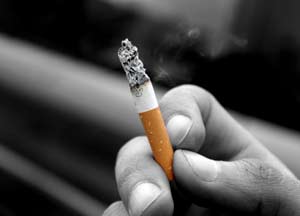Can I quit smoking with hypnosis? Looking at the evidence for hypnosis in smoking cessation

If adverts for hypnotherapy services are any guide then its use in helping people to quit smoking must be one of the most popular (and effective!) applications of hypnosis. Most of us will know someone who has tried hypnosis to help them give up, and many different programs for smoking cessation have been developed - invariably claiming high rates of success. But what is involved in a hypnotherapeutic treatment, and how effective are they? Thankfully many research studies have been done, and we have good evidence about the use of hypnosis to treat smoking.
How hypnosis is used for smoking cessation
Hypnotic techniques commonly used to treat smoking often include inviting smokers to imaginately associate (visualise) cigarettes with unpleasant situations such as a dry mouth, bus fumes, or with negative outcomes such as cancer. Suggestions are often given to encourage smokers to believe that they will lose the desire to smoke, and also aim to help them cope with withdrawal. A popular technique called Spiegel's method encourages smokers to concentrate on three ideas: 1) smoking is a poison for your body; 2) you need your body to live; 3) to the extent that you want to live, you owe your body respect and protection. Smokers are taught self-hypnosis and are encouraged to repeat these ideas every few hours, and any time they experience an urge to smoke. Covino and Bottari (2001) discuss treatment techniques in more detail.
The evidence
Hypnosis isn't the only way to treat smoking. Many other approaches, such as cognitive behavioural treatments, have beeen developed and as a result there is a real methodological rigour available to the field - essentially we know what makes a good (relatively unbiased) study. Key factors are:
- adequate follow-up: it's ok motivating someone to quit for a week, but we're really interested in long-term abstinence
- chemical measures of abstinence: it's one thing for a participant to tell you they've quit, but the chemical tests of abstinence aren't subject to the same biases
- a control group: some studies only report data from a treatment group. But some of these people might have quit anyway (people try and quit all the time) so you need a control group to help you assess how effective your treatment it
- randomisation: you need to randomise participants into a control group and a treatment group. Otherwise you could just end up with highly motivated people in your hypnosis group and unmotivated people in your control group. This wouldn't give a fair indication of how effective hypnosis is.
When we look at the outcome of studies we have to look at the quality of the studies as well as the results. Because so many studies have examinined the use of hypnosis for smoking cessation it is possible to systematically review all of these results:
- Green and Lynn (2000) Green and Lynn reviewed the results of 59 studies of hypnosis and smoking cessation. These studies included 'clinical reports' (which failed to include no-treatment control groups) and 'experimental research' (the best of which randomised participants to control and treatment conditions). The best of the research indicated that hypnosis was superior to a wait-list control group, which makes hypnosis an empirically supported treatment for smoking cessation. The effects of hypnosis were found to be generally comparable to non-hypnotic treatments. The evidence as to whether hypnosis was superior to placebo was inconclusive. The evidence for whether hypnotic susceptibility is related to treatment success was also mixed.
- Abbot, Stead, White & Barnes (1998) This is a Cochrane Review examining the use of hypnosis to promote smoking cessation. Cochrane Reviews are high-quality reviews of the scientific literature and are regularly updated. They looked at nine studies which compared hypnotherapy with control conditions. They used a high quality (strict) test of outcome by looking at studies which measured abstinence from smoking after at least six months follow up. They used biochemically validated rates where possible. The reports of success were highly variable (Some studies claiming very high success, some very low. This isn't what scientists like to see in studies - you normally expect to see treatment X having effect Y. If it isn't reliable then there is often something else going on which you haven't accounted for). With such variable data they were not able to demonstrate that hypnotherapy has a greater effect compared to other interventions or no treatment.
Non-hypnotic treatments for smoking cessation
- A 2004 Cochrane Review which looked at 123 studies found that nicotine replacement therapies (gum, inhaler, lozenge, patches) reliably help smokers to quit - almost doubling their odds of being abstinent at a 6 month follow-up.
- A separate Cochrane Review looked at the effectiveness of telephone counselling in helping smokers to quit. An analysis of 48 trials indicated a moderate effect (odds ratio approximately 1.4), with a dose-effect evident - i.e. more calls to the helpline proved to be more helpful. Overall three or more calls increased a persons odds of quitting compared to just being given self-help materials.
What is hypnosis?
Definitions of hypnosis
Types of suggestion
FAQ
Scientific theories of hypnosis
History of hypnosis
Animal hypnosis
Key people in hypnosis
Demand characteristics
Scientific research
States of consciousness
Neuroscience
Modification of suggestibility
Attention and hypnosis
Pain research
Hypnosis as a research tool
Genes and hypnotizability
What is hypnotherapy?
Is it effective?
Finding a therapist
Depression
Irritable bowel syndrome
Pain
PTSD
Smoking
Surgery
Weight loss
Hypnosis research papers
Suggestibility scales
Scripts
Videos
Forum
Organisations
Journals
Book reviews
© 2007-2019 Dr Matthew Whalley
